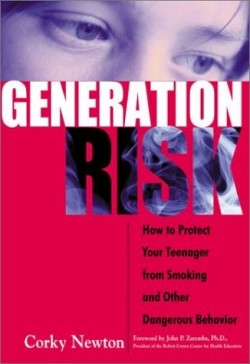Generation Risk
How to Protect Your Teenager from Smoking and Other Dangerous Behavior
It’s scary being a teenager, but it’s scarier being the parent of a teenager. Parents want to protect their kids from dangers, the very things that kids can’t wait to experience. None of the temptations are new, and the risks haven’t changed. Smoking remains one of the most visible forms of rebellion and a great way to be cool.
Newton is a thirty-year veteran of the business world and a tobacco industry executive. As the head of a youth smoking program, and as a parent, she understands how kids are attracted to smoking. This book is not as much about the tobacco industry as it is about communication between parents and their teenagers.
Part I, Understanding Teenagers and Risk, discusses teens that smoke, the appeal of risktaking, the special challenges of today, peer pressure, and popular culture. Brent, one of the many teenagers interviewed, writes: “Why do teenagers take risks? To find out their boundaries. For fun.” Newton lets readers know the facts—risk-taking is a normal part of growing up, and kids today don’t necessarily think these behaviors are serious. Kids are under immense peer pressure and don’t have far to look for alcohol, drugs, or tobacco products.
Part II, Laying the Foundation, deals with family issues of trust and communication. Knowing when to talk to teenagers and what to say to them is discussed. All of these chapters include practical advice for parents who might be under some stress themselves.
Part III is called How to Prevent Smoking. The chapter “Don’t Say Don’t” points out that the word “don’t” invites rebellion, and that any nonsmoking campaign telling kids “don’t smoke” was seen as a dare or challenge by teenagers. Tamara, a high school junior states: “It’s just a command. Kids get tired of people telling us what to do. That’s a word I hear at least a thousand times a day.”
Catching children doing things right, knowing the facts about smoking and addiction, and teaching them refusal skills are all practical things that parents can do. For parents who smoke, advice is given for helping children not get started smoking. Finally, Newton points out that parents need to “focus exclusively on your teenager,” and provides twenty-seven ways to help teenagers not start smoking and taking dangerous risks while nurturing trust. It is clear in this book that parents are in a position of positive influence.
Reviewed by
Tracy Fitzwater
Disclosure: This article is not an endorsement, but a review. The publisher of this book provided free copies of the book to have their book reviewed by a professional reviewer. No fee was paid by the publisher for this review. Foreword Reviews only recommends books that we love. Foreword Magazine, Inc. is disclosing this in accordance with the Federal Trade Commission’s 16 CFR, Part 255.

